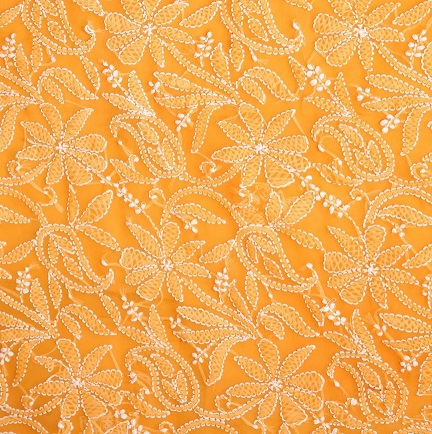SIGN UP FOR NEWSLETTER
Be the First to Know. Sign up to newsletter today

Chikankari kurti is a kurti with special embroidery. It is very popular in the summers. It is with done white thread on a white cotton fabric. Chikankari work is famous in Lucknow in Uttar Pradesh where hundreds of men & women practice this craft. This type of embroidery is done on table linen, sarees, lehengas, salwar suits,dupatas & kurtis.
Available at Delhi:- UP Emporioum, Anita Dongre, Dill Haat
Origin :Chikankari is white on white embroidery with a shadow effect. It is said to be of Persian origin.
There are references in to flowered embroidery on Muslin cloth even as early as the 3rd century. Noor Jahan,the Mughal empress & wife of Jehangir, is credited with introducing Chakkankari to India.
Shadow work was done on veils for several centuries.
1. First is the selection of the fabric -cotton ,muslin or georgette .
2. Further, the fabric is then cut to the required measurements as per the pattern.
3. In addition, flower designs are then printed on the fabric using block printing with wooden blocks.
4. Finally, the embroidery work is undertaken by skilled artisans.It is done with a needle & thread. In addition, this unique embroidery is done on the reverse & it creates a shadowy effect on the front side of the fabric.Further, the thickness of the thread finally determines or highlights the shadowy design.
5. Next is the washing of the fabric. As a matter of fact, this is done to remove the colours of the block prints designs. In addition, the fabric is startched (charakh is done ) to obtain the required stiffness.
For instance, the stitches are done on the back of the design. Hence, there is a shadowy effect that appears on the front. In addition, the mesh like embroidery gives the fabric the desired look & feel and elegance. Basically, the embroidery feels puffed up as there is a lot of thread work done on the reverse. Chikankari fabrics, Chikankari sarees, dupattas and Chikankari kurti are very popular in summer. Predominantly, Chikankari work was done on white fabrics or on pastel coloured cotton fabrics. However, trends have changed. Chikankari is now being done on georgette and silk as well. In other words, coloured threads are used in addition to white threads for the embroidery.
Be the First to Know. Sign up to newsletter today
130 views